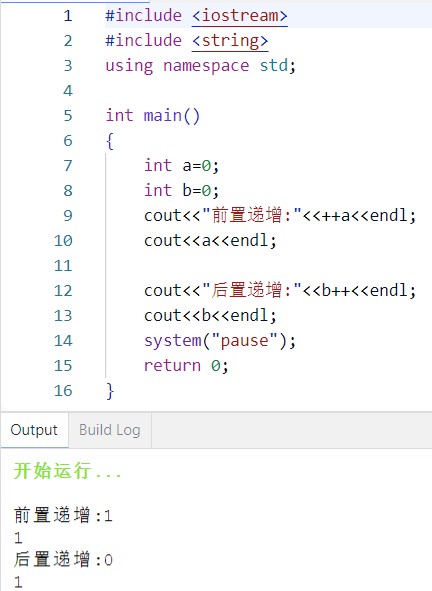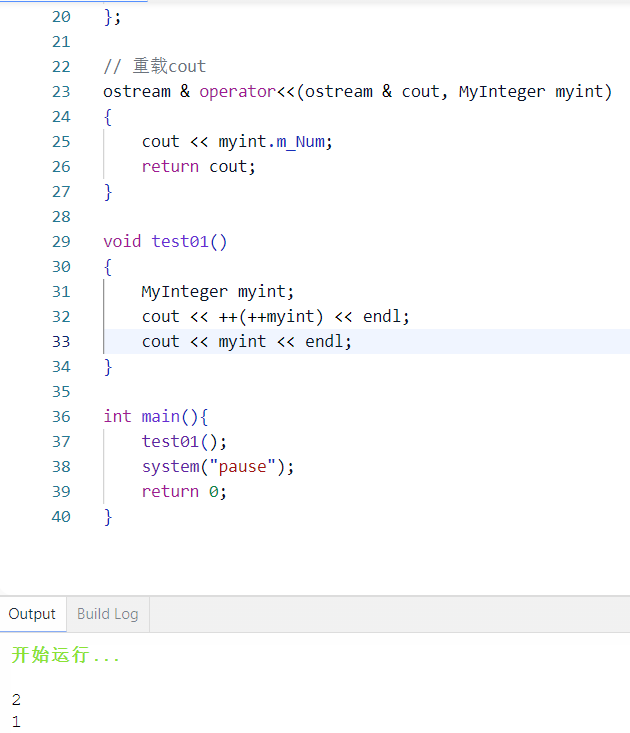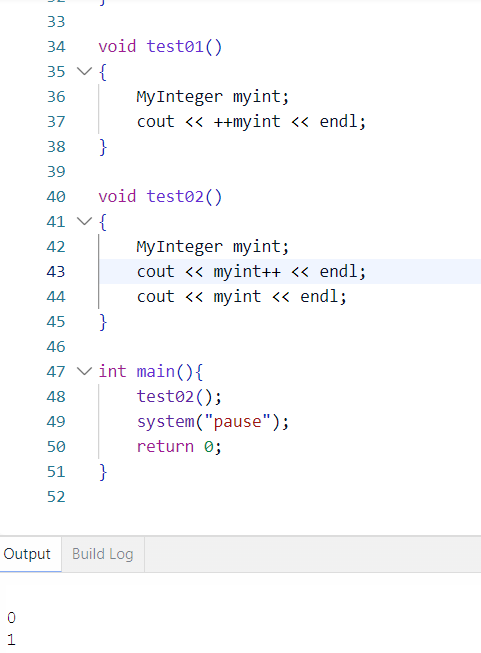C++知识切片①:运算符重载之前置递增和后置递增
发布时间:2024年01月04日
在进行运算符重载之前,不妨先看看常规的前置递增和后置递增的区别:

- 前置递增如a所示,a是先进行递增计算,然后再输出打印;
- 后置递增如b所示,b是先进行输出打印,再进行计算
前置递增的实现
1.先写好main函数及头文件
#include <iostream>
#include <string>
using namespace std;
int main(){
system("pause");
return 0;
}
2.自定义MyInteger类
由于运算符重载的目的是为了让同一运算符作用于不同类型的数据时产生不同的行为(这里的MyInteger类是我们定义的)
class MyInteger{
public:
MyInteger()
{
m_Num = 0;
}
private:
int m_Num;
};
class MyInteger:定义一个名为MyInteger的类。public::这是一个访问权限声明,表示下面的成员函数是公开的,可以被类的对象和main函数中直接访问。MyInteger():这是MyInteger类的构造函数。当创建一个MyInteger对象时,这个构造函数会自动被调用,表示类的初始化。private::这是一个访问修饰符,表示下面的成员是私有的,所以外部代码不能直接访问或修改它,但类的内部函数可以。
3.重定义cout
#include <iostream>
#include <string>
using namespace std;
class MyInteger{
friend ostream & operator<<(ostream & cout, MyInteger myint);
public:
MyInteger()
{
m_Num = 0;
}
private:
int m_Num;
};
// 重载cout
ostream & operator<<(ostream & cout, MyInteger myint)
{
cout << myint.m_Num;
return cout;
}
void test01()
{
MyInteger myint;
cout << myint << endl;
}
int main(){
test01();
system("pause");
return 0;
}
这段代码定义了一个重载的输出运算符 <<,目的是将 MyInteger 对象写入到输出流中。
ostream & operator<<(ostream & cout, MyInteger & myint):这是输出运算符<<的重载函数,接受一个ostream引用(通常是cout)和一个MyInteger类型的引用作为参数,并返回一个ostream引用。- 由于C++标准库规定只能有一个cout,所以只能用引用
cout << myint.m_Num;:将myint对象的m_Num成员写入到输出流cout中。return cout;:返回输出流cout,以便可以连续进行额外的输出操作,如cout << myint << endl否则由于返回的是空,则只能cout << myint。- 为了在
ostream & operator<<(……)函数中进行cout << myint.m_Num,允许访问私有成员变量m_Num,我们需要在类中声明全局函数作友元friend ostream & operator<<(ostream & cout, MyInteger & myint)
4.在类内实现前置递增
#include <iostream>
#include <string>
using namespace std;
class MyInteger{
friend ostream & operator<<(ostream & cout, MyInteger myint);
public:
MyInteger()
{
m_Num = 0;
}
// 重载前置++
MyInteger& operator++()
{
m_Num++;
return *this;//返回myint
}
private:
int m_Num;
};
// 重载cout
ostream & operator<<(ostream & cout, MyInteger myint)
{
cout << myint.m_Num;
return cout;
}
void test01()
{
MyInteger myint;
cout << ++(++myint) << endl;
}
int main(){
test01();
system("pause");
return 0;
}
-
新增的
MyInteger& operator++()函数定义了一个名为operator++的成员函数(想实现运算符重载功能,都是operator运算符的形式),该函数重载了C++中的前置递增运算符++。 -
MyInteger& operator++():返回类型为MyInteger的引用(MyInteger&),是为了对同一个数据进行递增操作 -
return *this;:返回当前对象的引用。这里使用了解引用操作符*和this指针,-
this是指向myint自己的指针,this指针只允许在类内使用
-
*this对this指针解引用,即获取了该地址上存储的myint数据,
-
返回值为引用,返回的是myint原地址上的数据(该数据是经过了
myint.m_Num++操作) -
如果不使用
MyInteger& operator++()而是MyInteger operator++(),则return的数据是重新开辟了一块新的地址空间上存储的,不能进行++(++a)这种操作
-
很明显,两次递增之后的myint按道理来说应该是2,但结果显示是1.原因是++myint之后的数据存储在一个新的地址空间上,而不是myint原来的地址空间上。
后置递增的实现
#include <iostream>
#include <string>
using namespace std;
class MyInteger{
friend ostream & operator<<(ostream & cout, MyInteger myint);
public:
MyInteger()
{
m_Num = 0;
}
// 重载后置++
MyInteger operator++(int)
{
MyInteger temp = *this;
m_Num++;
return temp;
}
private:
int m_Num;
};
// 重载cout
ostream & operator<<(ostream & cout, MyInteger myint){
cout << myint.m_Num;
return cout;
}
void test02()
{
MyInteger myint;
cout << myint++ << endl;
cout << myint << endl;
}
int main(){
test02();
system("pause");
return 0;
}
- operator++(int)中int作占位参数,告诉编译器这是后置递增, MyInteger不能返回引用,因为我们不能返回一个局部变量引用,否则在重载函数执行后,数据就被释放了,则不能访问数据

完整代码
#include <iostream>
#include <string>
using namespace std;
class MyInteger{
friend ostream & operator<<(ostream & cout, MyInteger myint);
public:
MyInteger()
{
m_Num = 0;
}
// 重载前置++
MyInteger operator++()
{
m_Num++;
return *this;//返回myint
}
// 重载后置++
MyInteger operator++(int)
{
MyInteger temp = *this;
m_Num++;
return temp;
}
private:
int m_Num;
};
// 重载cout
ostream & operator<<(ostream & cout, MyInteger myint){
cout << myint.m_Num;
return cout;
}
void test01()
{
MyInteger myint;
cout << ++myint << endl;
}
void test02()
{
MyInteger myint;
cout << myint++ << endl;
cout << myint << endl;
}
int main(){
test02();
system("pause");
return 0;
}
文章来源:https://blog.csdn.net/henghuizan2771/article/details/135395778
本文来自互联网用户投稿,该文观点仅代表作者本人,不代表本站立场。本站仅提供信息存储空间服务,不拥有所有权,不承担相关法律责任。 如若内容造成侵权/违法违规/事实不符,请联系我的编程经验分享网邮箱:chenni525@qq.com进行投诉反馈,一经查实,立即删除!
本文来自互联网用户投稿,该文观点仅代表作者本人,不代表本站立场。本站仅提供信息存储空间服务,不拥有所有权,不承担相关法律责任。 如若内容造成侵权/违法违规/事实不符,请联系我的编程经验分享网邮箱:chenni525@qq.com进行投诉反馈,一经查实,立即删除!
最新文章
- Python教程
- 深入理解 MySQL 中的 HAVING 关键字和聚合函数
- Qt之QChar编码(1)
- MyBatis入门基础篇
- 用Python脚本实现FFmpeg批量转换
- 如何解决安装Windows11时出现“这台电脑无法运行Windows11”
- 华云安攻击面发现及管理平台体验
- window 远程访问计算机
- 15万字408道软件测试经典面试题总结(附答案)
- layuiadmin新建tabs标签页,点击保存,打开新的标签页并刷新
- 动态规划(DP)---背包二维图
- 算法学习系列(二十三):最小生成树问题
- 大语言模型系列-ELMo
- Python陷阱-如何安全地删除列表元素?
- 实现本地存储函数useLocalStorage